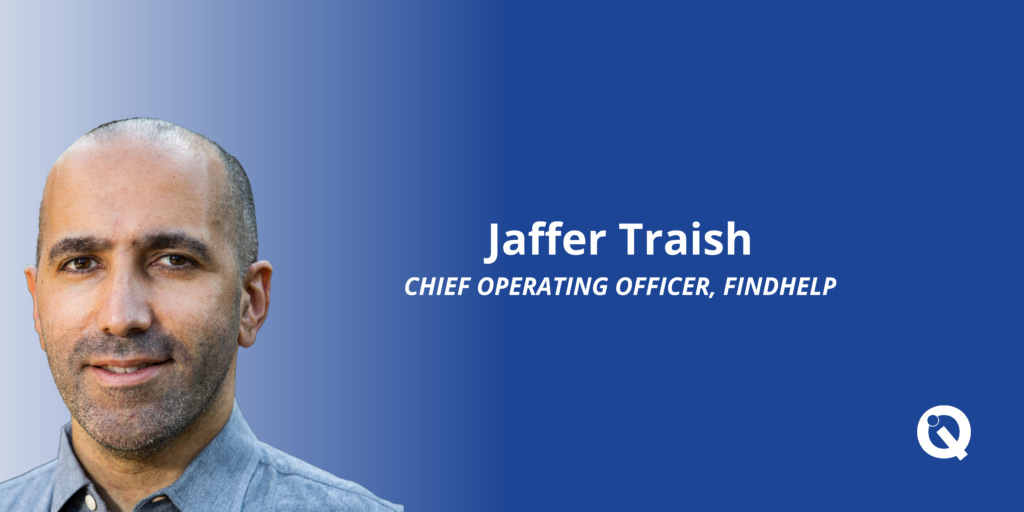Jaffer Traish, Chief Operating Officer of Findhelp, a social care network. Findhelp is a member of the Quality Institute.
Your organization previously was called Aunt Bertha. Why don’t we start with a question of why you decided to change the name?
The Aunt Bertha name served us well, and we’re still very fond of Aunt Bertha. Aunt Bertha represented the non-judgmental family member who takes care of you, listens to you, and is there in your time of need. Some customers still call us Aunt Bertha and that’s perfectly okay. But for a public facing search for anyone in the United States, we found “Findhelp” is more intuitive. People know exactly what we do.
Findhelp, a public benefit corporation, is a social care network. How do you connect and engage with consumers, and how are you different from what was previously available to consumers?
We are actually much more than a social care network today. We are a software platform that is helping customers and community organizations easily manage and coordinate care. The customers we serve are the heroes of the story as they strive to better reach and serve their communities. They’re the organizations using findhelp’s innovative features to assess people’s needs … to find the resources that best fit the consumers … and to ultimately coordinate that work across government, education, employers, and health care. We help our customers order goods and services for things like diapers and car seats so consumers can get them quickly. Or finding benefits for a consumer in their own health plan. Our software is used by over 3000 schools in the United States, for example, to help children have better case management of their clinical needs — and for parents to navigate and find resources. The early signs of a child’s challenges often reveal themselves at school. So those are just some of our projects. The dignity and ease of the consumer, and privacy of the consumer, is at the heart of everything we do. While the public can use findhelp.org for free and our customers purchase our enterprise tools to track their work, coordinate care, and integrate the system into their daily workflows.
What data do you collect, and how are communities using that data to inform the services they provide? Can you provide some examples?
The customers and the community organizations we work with collect information about the people they’re serving. Often, they ask us to help them make sense of this information. We provide them with reporting and analytics that they use every day to understand their impact. Some examples are how much time they’re saving their social workers with the tools — or reports about needs in their community. Why is dentistry the number one need in some regions? Perhaps because adult preventive care is not covered by Medicaid in some states. We help customers with policy research. We worked with academic universities to understand where immigration services are located and how to better connect people to those services. We worked with USC on a study about improving healthy food access in four East side Los Angeles neighborhoods.
Governments and communities make smarter investments if they understand capacity and needs, they can direct resources in a more informed manner. And we also help our health care customers. We’re not a health care provider, but the data that we provide when correlated with clinical and chronic disease, can help customers reduce emergency department utilization, hospital readmissions, improve patient satisfaction and more.
You are working in the maternity space in New Jersey. How would Findhelp support pregnant people?
Findhelp supports maternal health in many ways. ConnectingNJ, an initiative of NurtureNJ, uses a county-based single point of entry to connect pregnant and parenting families with the maternal health and support staff they need to raise healthy children. Our customer, Family Health Initiatives, provides the infrastructure for that system through their link platform, which they operate in partnership with the New Jersey Department of Health. Findhelp is integrated right into this platform to support county level maternal health hubs and other partner agencies to send and track social service referrals for families in need. We do this work across the country too. For example, we work with Partners for Family Health in Louisiana, a government organization. And we work with the Sarasota Medical Pregnancy Center in Florida and in many other states as well.
Finally, we like to ask a question beyond a person’s professional work. If you could choose anyone (throughout history or alive today) who would be your hero?
I’d have to recognize my uncle who lives in Wisconsin. When I was a community organizer, I wasn’t sure about going to college. My uncle walked my application with a $35 check to the University to make sure I didn’t miss my chance. He helped me get over fears of taking student loans and helped me get a job in the government serving the unemployed. He truly represented the findhelp persona — someone we all need in our moments of struggle. Thank you for the great chat!

